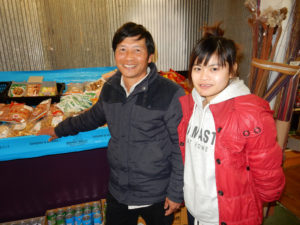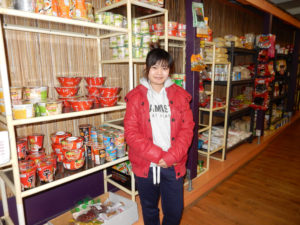Nhill’s refugee settlement story continues
An innovative program to resettle refuges at Nhill, a regional Victorian town, has moved into a second phase with more than a dozen businesses and organisations now employing workers from the refugee community.
 In 2009, a group of Karen refugees was recruited by poultry processor Luv a Duck because of a chronic shortage of local labour.
In 2009, a group of Karen refugees was recruited by poultry processor Luv a Duck because of a chronic shortage of local labour.
Over the next five years as many as 60 Karen were employed by the firm as it expanded its production. And for a long time it was the only business that did.
Now, as many as 14 local employers have hired members of the Karen community which makes up about 10 per cent of the local population of about 2000.
These include the local schools and hospital, a furniture manufacturer, farmers, a wild flower nursery, cafés, a metal fabricating firm, the local council and hospitality businesses.
And there are two Karen-owned businesses in the town.
“The settlement of the Karen here has entered a second phase,” said John Millington OAM, a former General Manager of Luv-a-Duck who was responsible for the original recruitment of the Karen.
“We now have about 14 businesses and other organisation who are employing Karen workers. It’s a sign that we have social cohesion and that the broader community has really embraced the Karen,” he said.
One of the first Karen brought to settle in Nhill was Kaw Doh. He lived in a refugee camp on the Thai-Burma border for seven years and came to Australia as a refugee ten years ago.
He and several other Karen moved from their community in Werribee to take up work in Nhill. “I found it very different at first, I lived in a big house with ten to twenty people,” Kaw Doh said.
“Looking back it was a good experience, coming to live here (in Nhill). Melbourne was very expensive and here we had work,” he said.
“Since the Karen settled here about ten families, including me, have bought houses,” Kaw Doh said.
Now he has his own business too. Last year, he opened a grocery shop in the main street of the town selling traditional Karen foodstuffs and other items.
“I saw there was a need for people to be able to buy traditional foods because otherwise they would have to drive to Werribee to get them and that can be a long and dangerous drive,” Kaw Doh said.
“So we opened the shop,” he said.
Kaw Doh employs another Karen Wah Ka Paw Law, 22, who arrived in Nhill from a refugee camp in Thailand in 2015.
She is studying English and sewing part-time at the Nhill Learning Centre and also working in the shop.
“I like living in Nhill. We have everything we need and it’s very quiet,” Wah said.
Wah was born in the Mae La refugee camp on the Thai/Burma border. She studied at school and graduated from Year 10. Wah came to Australia by herself when she was 20 years old and settled in Nhill with her aunt’s family.
She says she misses her family but she likes Australia because it is a good place to learn and it is a free country.
In the future she hopes to study and work in child care.
Another young Karen refugee who has flourished in Nhill is Hal Loo.
 Hal is emblematic of the Karen experience in Nhill. The 27-year-old mechanic at the local Halfway Motors loves his job and his community.
Hal is emblematic of the Karen experience in Nhill. The 27-year-old mechanic at the local Halfway Motors loves his job and his community.
“I love coming to work and I love to go fishing,” he says. “Nhill is a good place for us Karen.”
Hal, his parents, two brothers and three sisters spent years living in a tent in a United Nations refugee camp on the Thai-Burma border after the Burmese government burnt his village.
The Burmese Government has persecuted the Karen hill-tribe people since 1949 and there are an estimated 150,000 Karen living in camps.
Hal’s employer Kim Moyle, owner of Halfway Motors, says the town has been given a new lease of life with the arrival of the Karen.
“It is difficult to find skilled labour and Hal has been great for us. He’s become part of the family and we take him everywhere. He loves Nhill and the space here and he loves his job. It was Hal’s persistence that got him the job. He was a special kid.” Ms Moyle said.
Half Way Motors now employees three Karen.
She said the settlement of the Karen had had a positive impact on Nhill.
“It’s important for Nhill’s future economically but Aussies can also learn a lot from them and their values of community and family.
“They’re kind and polite, they work hard and they’re happy. We can learn a lot from that,” Ms Moyle said.
In 2015, a study into the economic and social impact of the resettlement, carried out pro-bono by Deloitte Access Economics and by settlement agency AMES Australia, found the program produced significant economic and social benefits.
Over five years 70.5 full time jobs were created, representing a three per cent increase in total employment across the district, and $41.5 million was added to the Gross Regional Product.
Since the report was completed, another 40 jobs have been created in and around Nhill and there are now 40 Karen children in local schools.
The study, titled ‘Small towns Big returns – Economic and social impact of the Karen resettlement in Nhill’, found that like many other regional towns Nhill faced a declining working-age population and the resultant loss of services and amenities and the flow-on implications for the economic and social prosperity of the town.
It found that a declining population in the town and a very low unemployment rate were key factors in the resettlement.
The study also identified significant social outcomes stemming from the resettlement program, including: the arrest of population decline; revitalised local services and increased government funding; and, an increase in social capital across both communities.
It found the necessary factors in the success of the Karen resettlement included: the availability of employment and accommodation; strong leadership in the host community; a welcoming host community; support for the new families; management of the degree and complexity of ‘cultural adjustment’ on both sides; and, settlers prepared to adapt to a new environment.
Laurie Nowell
AMES Australia Senior Journalist












